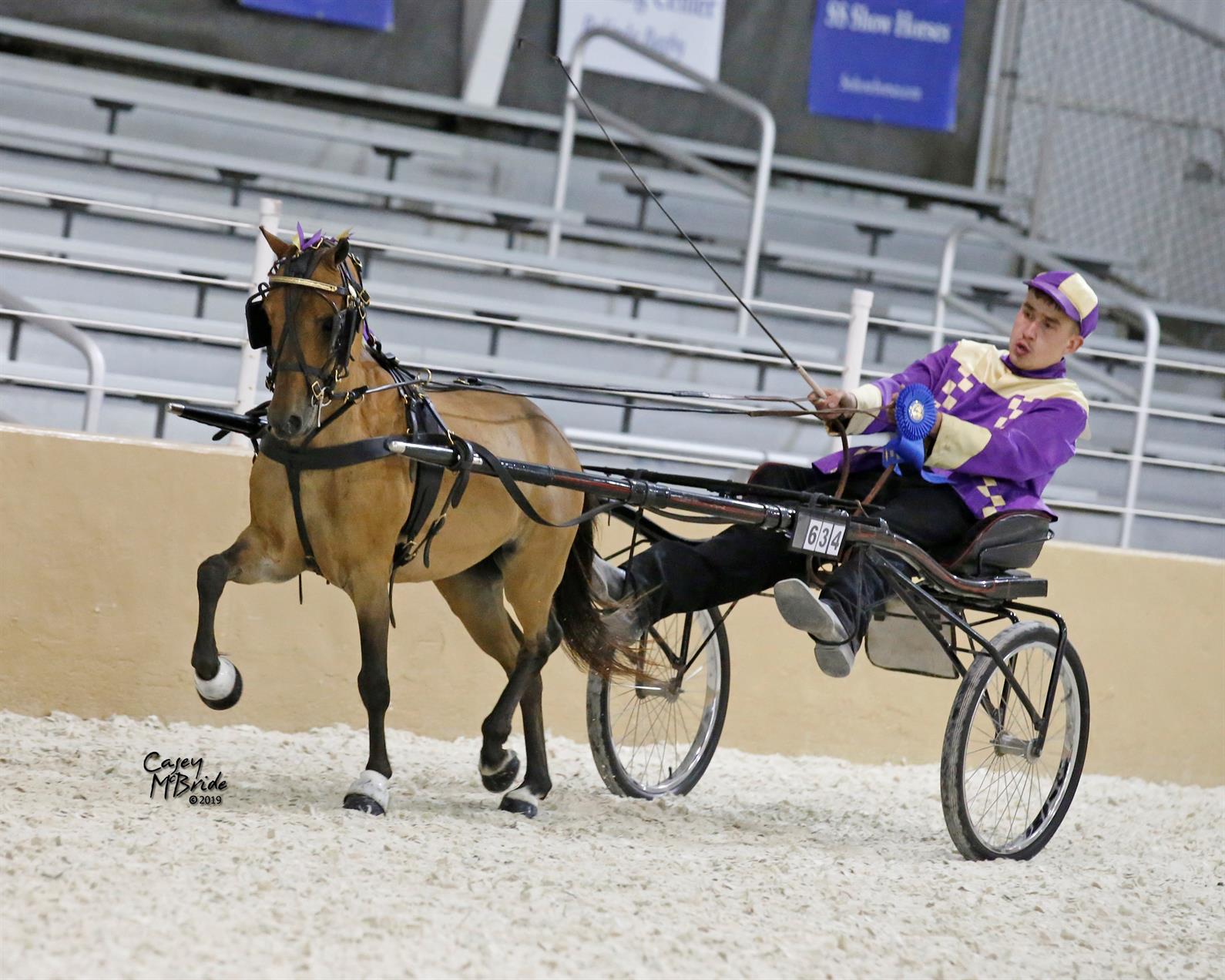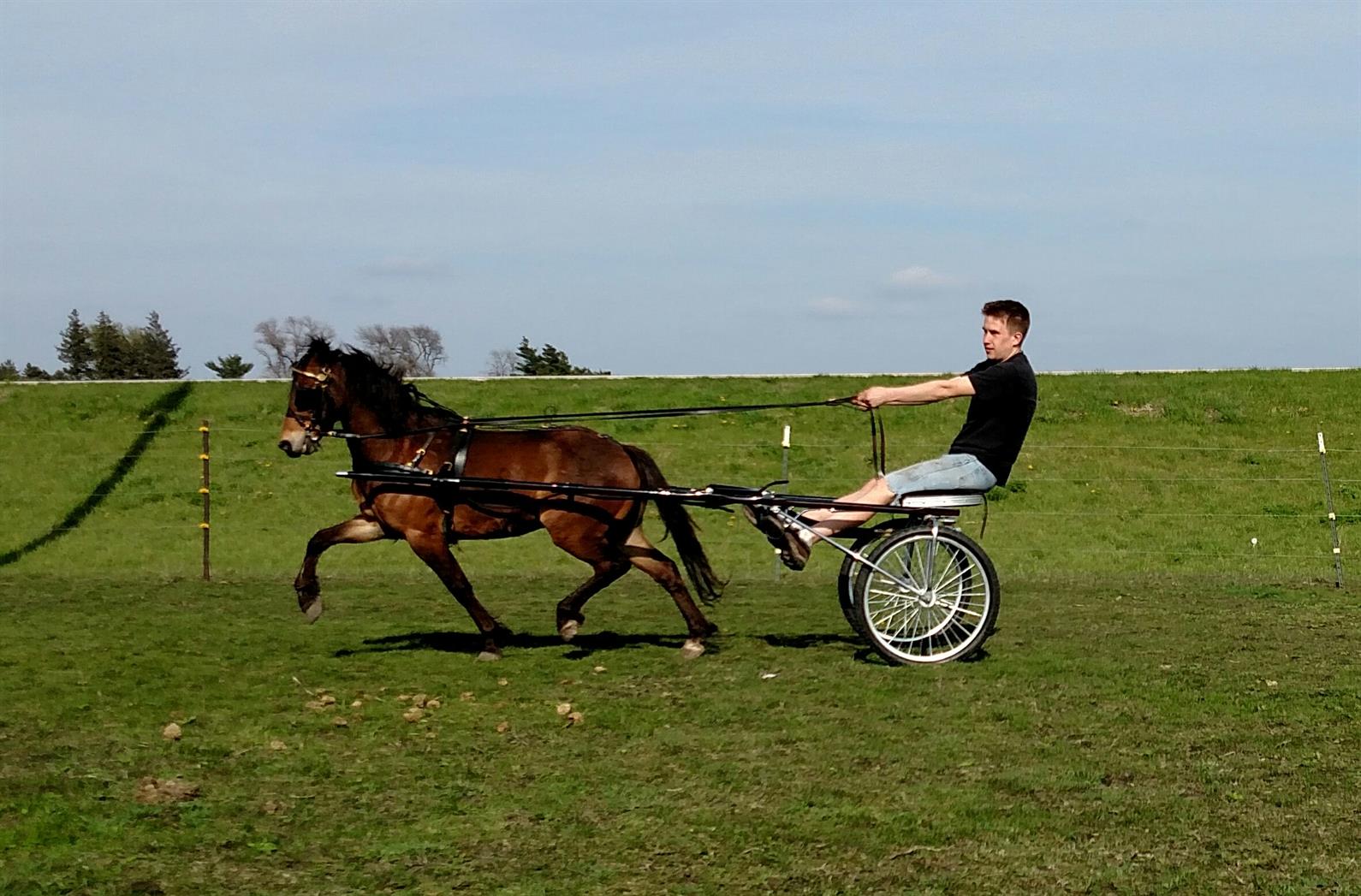The American Shetland Pony Club (ASPC) recently hosted the 73rd annual National Congress in Lake St. Louis, Mo., where registered Shetland ponies vied for national championship titles in everything from halter to jumpers in-hand to multi-hitch driving.
One small but mighty group competing for a variety of championships was the Palas family of Story City, Iowa. Greg Palas, along with his wife and their three children, brought a very special group of Shetland ponies to show in the Conquering Obstacles Overcoming Limitations program classes, also known as “COOL” classes.
The COOL program is committed to making equestrian sport inclusive and accessible, and to encourage intellectually and physically challenged individuals to expand their enjoyment of Shetland ponies and miniature horses by offering adaptive classes at pointed shows. COOL offers modifications to the halter, showmanship, and driving sections at horse shows across the country for adult and youth exhibitors competing with an intellectual or physical disability in compliance with the Americans with Disabilities Act.

Palas, COOL Committee Chairman for the ASPC, is a passionate advocate for this program and first became involved 18 years ago as a way to help his sons, Justin and Ryan, who were both born with learning disabilities. “We came up with Conquering Obstacles Overcoming Limitations [as a new name for the program] because that is what people with intellectual and physical disabilities have to do each day,” said Palas.
When the family first moved to acreage, the Palases wanted horses, but eldest son Justin was afraid of animals. “We got a couple [of miniature horses], and my daughter started showing them. But [Justin] was still really afraid of them,” recalled Palas.
Watching his sister show and win ribbons got Justin thinking that working with the horses might be a fun thing to try. “He wanted to lead one of our mares to the trailer, so we said, ‘Okay, let’s see what happens,’” said Palas. “She made it to the trailer, and the next day, before anyone else was up, he was out in the barn and had her in the halter, and that’s all she wrote.”
According to Palas, providing opportunity for all on the spectrum of physical and intellectual ability is more than doable for any breed organization, and he has a deep understanding that it takes a certain type of horse to show in COOL classes.
“It does take a special horse, one that’s patient and tolerant of kids and adults with special needs,” said Palas. “Those who have a physical disability have to have a horse that’s not going to run over them and those who have an intellectual disability are usually a little more timid and afraid, so they need a horse that is a little calmer with them. These horses are so special.”
Justin has a profound relationship with his Classic Shetland pony, G-Diddy. “[G-Diddy] had won Congress before, so we figured he’d be pretty expensive, and could Justin handle him? We bought G-Diddy from [current ASPC President] Steve Henderson. Or rather, Justin did,” said Palas. “He made the payments, and he was going to take care of the pony, so the first year was all learning and trying to get to know each other. The two of them became inseparable, and they actually won Congress two years later.”
The ability to show and work with the Shetlands and “minis” has transformed the brothers. When asked what his favorite discipline was, Justin enthusiastically declared, “Roadster! I like to go fast. I have a need for speed,” and this young maverick will drive just about anything now.

“From being afraid of animals just a few years ago to being fearless, it’s what the whole COOL program did for [Justin.] It gave him the opportunity to work with a horse on his own and gain that confidence. It’s been really good for my boys,” said Palas.
The COOL program has had a positive impact on all of its exhibitors, and the ASPC is seeing more classes at the national shows and at the local level, with the COOL Committee consistently encouraging more shows across the country to add classes to their prize lists.
“We’re getting more and more local involvement, and that’s where it needs to begin,” said Palas. “If you’re going to a show and they don’t have any COOL classes listed, we encourage people to ask the show manager to add a class.”
Thanks to the COOL program, Justin and Ryan have become more and more outgoing, both in and out of the show ring. “It’s about building that self-confidence, they just know that they can do things now,” said Palas. “[Justin] went out for cross-country in high school, so he’s a runner and he’s more social.”
Justin also won a national championship with his roadster horse, beating professional trainers. “It’s amazing, from not being able to compete with the youth at all to now having that confidence to go up against anyone,” said Palas.
Palas said an advantage to using Shetland ponies in adaptive competition is their size. “They’re smaller, for starters. Especially if you’ve got a person who is more hesitant. They can be a little easier to handle, and you can start out with the minis and grow into the Shetlands and beyond. It’s all about growing the confidence, and starting out small allows them to work up to bigger horses and pressure.”
The COOL Committee believes that any breed competition or affiliate organization can implement their own version of the program and advises beginning with a halter class. “Build up to your riding and driving classes. In any breed, there is always going to be a calm horse that anybody can walk around in a circle, so definitely start with halter. As interest grows, add more classes.” said Palas.
The most important part of the program for the Palases and the other exhibitors is ensuring that everyone has a place and a way to do what they love, spend time with their horses, and show them off, regardless of what their physical or intellectual ability may be.


